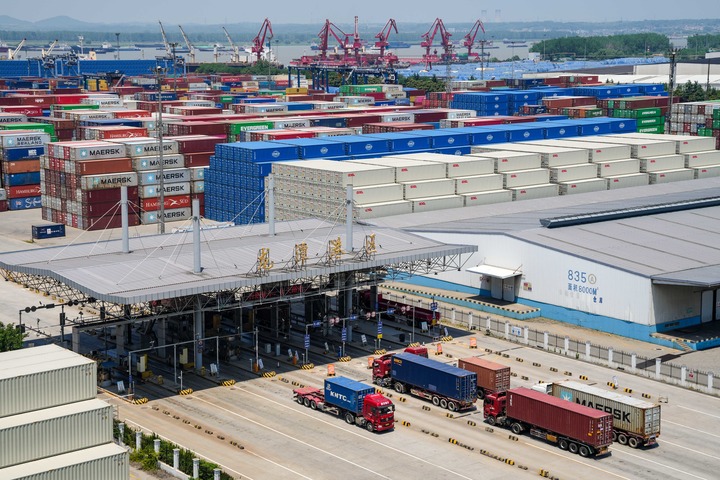China accelerates trade integration to boost economic development

Aerial photo taken on May 6, 2022 shows a view of the Longtan Container Terminal of Nanjing Port in Nanjing, Jiangsu Province. (Xinhua/Li Bo)
China wil select certain areas to carry out the integrated development of domestic and foreign trade, said Gao Feng, the spokesperson of China's Ministry of Commerce (MOC), recently.
In January this year, China's State Council has issued the guidance on promoting the integrated development of domestic and foreign trade and proposed to carry out pilot programs in selected regions, in order to boost economic development.
According to industry insiders, among China's pilot free trade zones (FTZs), free trade port (FTP) and other platforms for opening-up, regions with sound industrial foundations are expected to be the first batch of selected regions to carry out the pilot programs.
-- Pilot FTZs expected to take lead
Zhao Ping, vice dean of the Academy of China Council for the Promotion of International Trade, said that China's policy for the trade integration pilot program will refer to international high standards and amplify its reform and innovation approaches, to effectively align domestic and foreign trade rules.
The trade integration pilot program implies that China will shift from domestic to international standards for its products. It will also impose uniform standards, such as production line, production standard and quality requirements, for both domestic and foreign trade products, according to Zhang Jianping, director-general of the China Center for Regional Economic Cooperation of the Chinese Academy of International Trade and Economic Cooperation (CAITEC)
China may launch the trade integration pilot program in the FTZs, FTP and comprehensive bonded zones, export processing zones and other areas under special customs supervision, which have higher degree in trade and investment liberalization and facilitation, with higher degree in concentration of foreign trade enterprises and own-brand manufacturers.
Industrial foundation is also important for China's trade integration. Zhao Ping also stated that the trade integration pilot program should focus on connecting industrial and supply chains, continually improve the ability to serve China's higher level of opening-up, and provide businesses with development opportunities by institutional innovation.
-- Favorable policies to benefit trade integration
While planning the trade integration pilot program, China is accelerating trade integration nationwide.
A conference on the ministerial working mechanism for promoting the trade integration was held recently, marking another improvement in promoting the trade integration.
According to the conference, China will accelerate the trade integration through reform, innovation, and digital technology empowerment.
Meanwhile, Chinese enterprises are probing into trade integration pilot program.
Qingdao Fusheng Food Co., Ltd., which focused on food import and export in the past, has accelerated its development in domestic market since 2016. Currently, the company's dealer and agent business has expanded from local place to other regions in the country, with its sales in domestic market accounting for more than 55 percent of the total, said Zhang Deyan, general manager of the company.
-- Broader market space
China's trade integration has vast development potential.
The MOC will encourage businesses to apply the same production lines and standards to both exported and domestic products, to ensure that they are subject to the same quality criteria in both markets.
At the same time, the MOC will continue to intensify reform and innovation, so as to align domestic and foreign trade rules. It will also reinforce digital technology empowerment for related industries and promote supply chain integration.
According to Zhao Ping, China's institutional reform and innovation will generate additional policy benefits for trade integration, while digital technology empowerment will help vitalize Chinese micro market players, more effectively utilize domestic and foreign trade market resources to upgrade the modernization of the industrial chain and supply chain, and create new strengths for international competition and cooperation.
Guo Jingke, secretary-general of Santong Alliance, said that "Santong" standards, namely the domestic and foreign products are both imposed uniform standards including production line, production standard and quality requirement, will aid in narrowing the quality and trustworthiness gaps between domestic and foreign trade products.
Guo added that the uniformed standards will not only help satisfy domestic market demands, but also improve China's supply system's quality and level, leading businesses to high-quality development under advanced international standards.


